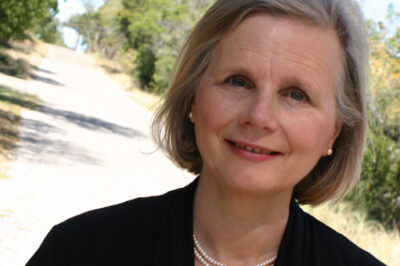Oh, but he did!
Jesus chose twelve men to be with him. What is often forgotten is that a group of women accompanied him too.
Luke’s gospel describes these women:
- Soon afterward Jesus began a tour of the nearby towns and villages, preaching and announcing the Good News about the Kingdom of God. He took his twelve disciples with him, along with some women who had been cured of evil spirits and diseases. Among them were Mary Magdalene, from whom he had cast out seven demons; Joanna, the wife of Chuza, Herod’s business manager; Susanna; and many others who were contributing from their own resources to support Jesus and his disciples. (Luke 8:1-3)
A group of women stayed with Jesus as he was crucified, even when all the men abandoned him:
- Some women were there, watching from a distance, including Mary Magdalene, Mary (the mother of James the younger and of Joseph), and Salome. They had been followers of Jesus and had cared for him while he was in Galilee. Many other women who had come with him to Jerusalem were also there. (Mark 15:40-42) (This word for “follow” is also used when, for example, Jesus called Matthew and Philip and said, “Come, follow me.”)
It was a group of women who were the first to know about Jesus’ resurrection:
- But very early on Sunday morning the women went to the tomb, taking the spices they had prepared. They found that the stone had been rolled away from the entrance. So they went in, but they didn’t find the body of the Lord Jesus. As they stood there puzzled, two men suddenly appeared to them, clothed in dazzling robes… It was Mary Magdalene, Joanna, Mary the mother of James, and several other women who told the apostles what had happened. (Luke 24: 1-4, 10)
In a culture where women had few if any rights, it is extraordinary that the gospels record the names of several women who followed Jesus. We know there were others too. For example, Jesus encouraged Mary, sister of Martha and Lazarus, to take on the posture of a disciple, learning at his feet.(Luke 10:38-42) Martha, herself, had deep theological conversations with Jesus. I’d like to think, but we’ll never know, that women were among the “seventy other disciples” who Jesus sent out in Luke 10.
The named women are:
- Mary Magdalene
- Joanna
- Suzanna
- Mary, mother of James and Joseph
- Salome (who may have been the mother of James and John)
So then why were the 12 male disciples so important? Why, for example, didn’t he have six of each gender? I’d like to postulate a theory. (And yes, I know that maybe the 12 men represented the twelve tribes of Israel etc, etc.)
It seems to be a principle that God limits himself within any given context and culture in order to reach people to become his followers. For example, we know it was not God’s will that Israel be governed by a king. (1 Samuel 8:5-20) But once the nation had chosen to go that route, God worked within that context. The argument could be made that God didn’t want a temple built for him, ((2 Samuel 7: 5-7, Acts 7:49-50), it was David’s desire to build him one. Yet God chose to bless the temple that Solomon built.
The culture of Israel at the time of Christ was indubitably patriarchal. Women were often regarded as mere possessions. Aside from opening himself to charges of immorality if women had been among the twelve, I suspect a woman’s testimony about Jesus’ resurrection would have been given little credence. We know that the eleven disciples themselves thought the women were speaking nonsense when they came and told them that Jesus had been raised from the dead. (Luke 24:11) God so loved the world… is a principle that transcends everything else. God limited himself within the patriarchal culture of the time in order to reach the most people with the transforming message of the Gospel.
What do you think? Tell us on our Facebook page!
Adapted from Felicity Dale’s blog, Simply Church. Felicity Dale is an author and an advocate for women in the church. She trains people to start simple/organic/house churches around the world.







Leave a Comment
You must be logged in to post a comment.